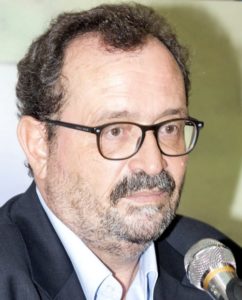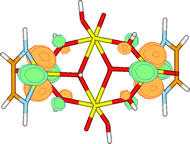
Sigalas Michael
Professor
Laboratory of Quantum and Computational ChemistryAristotle University of Thessaloniki
Faculty of Sciences,
School of Chemistry
54124, Thessaloniki
Dr. Michael Sigalas studied chemistry at the Aristotle University of Thessaloniki (1980) and after obtaining his Ph.D. from the same University in 1984. In 2011 he was appointed as a Lecturer at the Department of Chemistry of the Aristotle University of Thessaloniki, where he is currently a Professor.
He has worked on postdoctoral research at the Laboratoty of Theoretical Chemistry of the University Paris Sud of France with Prof. Odile Eisenstein and at the Laboratoty of Theoretical Chemistry of the Universityof Calabria of Italy with Prof. Nino Russo.
He and his research team has awarded Prizes of Excellence from the Ministry of Education of Greece (2012) and Aristotle University of Thessaloniki (2009), as well and MERLOT Chemistry Classics Award from the organization Multimedia Educational Resource for Learning and Online Teaching (MERLOT) Minneapolis, USA (2008).
From 2015 he is President of the Βoard of Directors of the Centers for the Dissemination of Sciences and Technology Musseum, NOESIS of Thessaloniki.
He is Co-Editor of the e-book “Molecular Symmetry and Group Theory” and editor of the e-book “Computational Chemistry”.
Teaching
- Quantum and Computational Chemistry
- Applications of Mathematics in Chemistry
- Applications of Informatics and Communication Technologies on Chemistry Education.
Research
Quantum and Computational Chemistry
 
Application of computational methods, such quantum chemical semi-empirical methods, ab initio and density functional methods for the study of molecular and electronic structure, thermodynamic stability, chemical, electric, magnetic and phasmatoscopic properties of molecules, solids and chemical systems in general. Design of new chemical compounds and materials with targeted properties. |
Applications of Informatics and Communication Technologies on Chemistry Education
  Development and implementation of software for the study and visualization of chemical data with the aim of extracting, interpreting and communicating of quantities of chemical interest. Development and implementation of software for the study and visualization of chemical data with the aim of extracting, interpreting and communicating of quantities of chemical interest.
Development of multimedia and semantic web platforms for the communication of chemistry topics and data and for chemical education. Development and use of mathematical and interactive simulations of chemical processes, experiments and laboratories. Development and implementation of synchronous and asynchronous distance education systems. |

